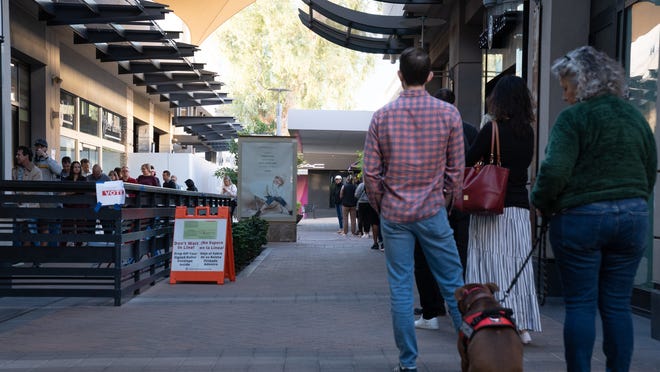Proposition 209: Arizona voters back lowering maximum interest rates on medical debt
 Stephanie Innes
Stephanie Innes
Arizona voters on Tuesday passed Proposition 209, the Predatory Debt Collection Act.
The measure has been touted as a way to protect Arizonans with medical debt from bankruptcy and poverty. Opponents from the business community say it's too broad and will have the unintended consequence of making it more difficult for working Arizonans to get loans.
The Associated Press called the race late Tuesday.
"While vote counting will not be finished for several more days, these returns demonstrate that Prop 209 will become law in January," supporters from the group Healthcare Rising said in a statement.
Backers from Healthcare Rising who gathered Tuesday evening at The Pemberton in downtown Phoenix were optimistic as early results showed a strong lead for "yes" votes.
"It's looking promising. This is something Arizonans have needed for a long time," group spokesperson Morgan Tucker said shortly after 9 p.m. "No one should lose their livelihood because of a sickness. Not ever."
Reacting to the results Wednesday morning, a spokesperson for opponents of the measure said Proposition 209 misled voters.
Amber Russo, a spokesperson for Protect Our Arizona, said voters did not have a true picture of how Proposition 209 will impact them financially. Since Proposition 209 affects more than just medical debt collection, she predicted it would become more difficult for working Arizonans to obtain loans.
"This impacts the collection of all debts," said Russo, who owns a financial company in Tucson. "I think this is going to take hold in so many different areas of our economy. It's unfortunate voters didn't understand the real impact. Consumer advocates behind this hid it under a medical title."
Proposition 209 lowers the maximum interest rates on medical debt and changes several rules on general consumer debt collection.
The statewide ballot measure not only lowers the interest rate cap on medical debt, it also increases the value of assets protected from certain creditors, including tax liens from state and local governments.
The cap on medical debts in Proposition 209 applies only to medical debts incurred after the measure takes effect. In other words, old medical debts aren't protected with the 3% maximum cap.
Elections: Arizona voters will decide these ballot measures on Nov. 8
But Arizonans with old debts will be protected in other ways by Proposition 209, including a reduction in wage garnishment and an increased value on assets like homes and cars that are protected from creditors.
Opponents included several members of the business community, including financial institutions. They say the way the initiative is written is too broad because some of its components will apply to more than just medical debt. The measure raises the value of assets shielded from all creditors, not just health care creditors.
Critics also said the measure will weaken creditors' ability to collect debts. As a result, financial institutions will be less willing to give out loans, thus hurting those working Arizonans that the measure is trying to protect, detractors say.
Backers of the measure emphasize the initiative doesn't forgive anyone's medical or consumer debts. Rather, it gives people leverage to pay what they owe without losing their homes, cars and all their savings.
During a year when inflation and the economy are of concern to voters across the U.S., Proposition 209 is attracting some national attention as a test case for other states, according to the Fairness Project, a national nonprofit that funds, organizes and advocates for ballot measures and supported Proposition 209.
“Before now, voters had never taken up medical debt on a statewide ballot measure, but Arizonans have charted a path forward to take on predatory lenders through direct democracy," Fairness Project executive director Kelly Hall said in a statement Wednesday.
"We’re looking forward to working with citizens in other states who want to pass more ballot measures to protect working families from exploitative lending practices."
Arizonans Fed Up with Failing Healthcare is the ballot measure committee behind Proposition 209. Healthcare Rising Arizona is the health care advocacy group promoting it, with support from California-based SEIU United Healthcare Workers West union.
Other supporters include the Arizona Faith Network, the Arizona Students' Association, the Southwest Fair Housing Council, and the Arizona Education Association.
Among those who have signed on as opponents of Proposition 209 are Victor Riches, president and CEO of The Goldwater Institute; chambers of commerce in both metro Tucson and greater Phoenix; and Paul Hickman, president and CEO of the Arizona Bankers Association.
Liz Gorski, a small business owner from Prescott, was waiting for results Tuesday at The Pemberton. Gorski spent years trying to reduce the medical debt she incurred nearly two decades ago because of a car accident.
As a single mother, Gorski moved frequently because of problems paying her bills, needed loans to go to school, and said she was once sued by a credit card company for $2,500.
"Wages are not that great in Arizona and it's insane what it takes to rent a house or an apartment. It's super-hard," she said.
Gorski joined Healthcare Rising and threw her support behind Proposition 209 with the hope of helping other people avoid the struggles she endured, she said.
The most recent data from the Urban Institute, a Washington, D.C., think tank, says slightly more than one-quarter of state residents — 27% — had any kind of debt in collections, and the median level of overall debt in collections is $1,903. The number is based on credit data from February 2022.
Backers of Proposition 209 say medical debt sometimes shows up in general debt categories because people use credit cards to pay their health care bills.
People of color, who are also more likely to be without health insurance, are disproportionately affected by debt, the Urban Institute research says.
Reach the reporter at Stephanie.Innes@gannett.com or at 602-444-8369. Follow her on Twitter @stephanieinnes
Support local journalism. Subscribe to azcentral.com today.